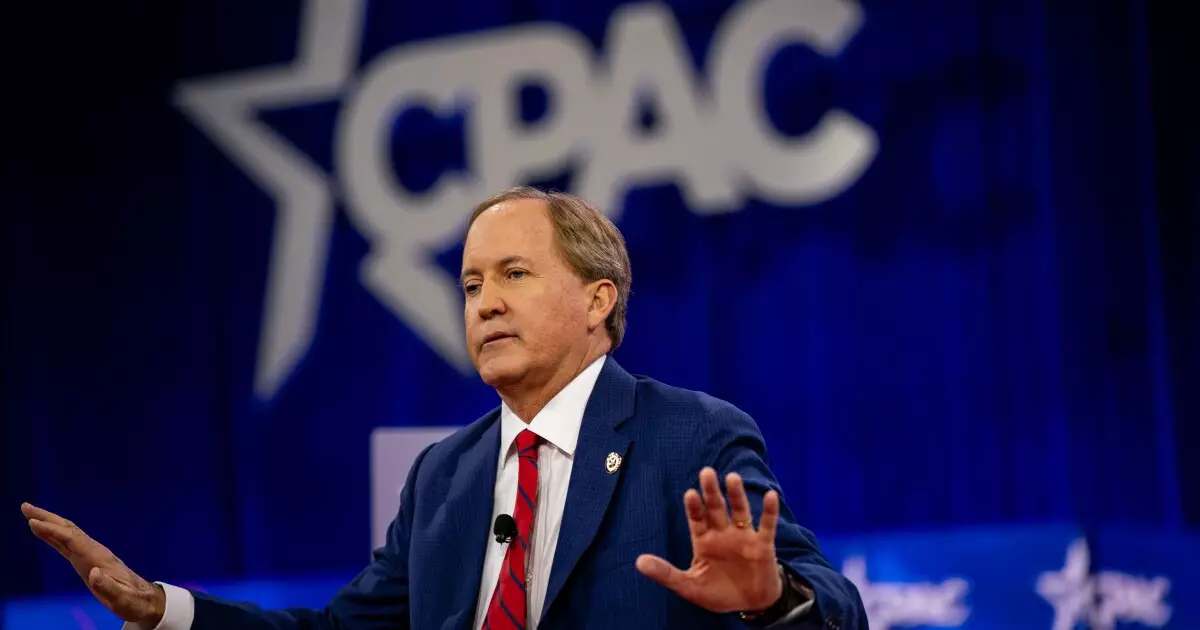In a vivid demonstration of the intersection between finance and politics, Texas Attorney General Ken Paxton concluded a protracted 14-month review of Wells Fargo. This review could have resulted in the bank facing restrictions on underwriting governmental bonds within the state due to its link to the Net-Zero Banking Alliance (NZBA). By withdrawing from this alliance, Wells Fargo has navigated a complex landscape of political pressure and regulatory scrutiny, reflecting a broader trend concerning environmental, social, and governance (ESG) practices among financial institutions.
Texas has positioned itself as a pioneer in enacting laws aimed at curtailing practices perceived as detrimental to its vital fossil fuel sector. In line with a 2021 law, state and local governments cannot enter into contracts over $100,000 with businesses that boycott fossil fuel endeavors. This legislative stance arises from an increasing sentiment among certain political factions that view ESG policies as hostile to traditional industries. The timing of Paxton’s review in October 2023 was not coincidental; it coincided with public scrutiny of several banking giants, including Bank of America and JP Morgan, indicating a concerted effort to hold these institutions accountable regarding their environmental commitments.
The decision by Wells Fargo to end its association with the Net-Zero Banking Alliance represents a calculated move. Attorney General Ken Paxton embraced this decision, framing it as a commendable shift toward alignment with the state’s economic interests. He voiced a clear message to other financial entities: prioritizing the oil and gas sectors over ESG initiatives may be essential for continued renewable partnership within Texas. However, the bank’s response to the scrutinizing inquiries remained notably subdued, with only a confirmation of their withdrawal from NZBA, raising questions about their long-term strategic commitments.
Wells Fargo’s review period coincided with its role as a senior underwriter in significant bond deals throughout Texas, demonstrating its integral position in state financial dealings. The bank played a pivotal role in landmark bond sales, including a $723.5 million revenue bond for the Dallas Fort Worth International Airport and a $1.63 billion revenue issuance for the Texas Transportation Commission. Despite the review, it continued to secure vital underwriting opportunities, illustrating the complex relationship between regulatory scrutiny and financial necessity.
As Texas intensifies its scrutiny of financial institutions, the future remains uncertain, especially concerning the constitutionality of the anti-ESG laws. A lawsuit filed by a business group against Paxton and Texas Comptroller Glenn Hegar may set a precedent that challenges these regulations. This legal scrutiny reflects broader nationwide debates around the expansion of ESG practices in finance. Should the law be deemed unconstitutional, it could significantly reshape the dynamics between state economic interests and corporate ESG commitments.
The recent happenings in Texas resonate with similar occurrences across the nation, particularly in states like Oklahoma, where Wells Fargo’s departure from the lead underwriting position for a substantial bond sale underscored the ramifications of such anti-ESG regulations. These actions illustrate the ebb and flow of market sentiments and political directives that financial institutions must navigate.
The case of Wells Fargo highlights the intricate tapestry of finance, politics, and societal values in the contemporary landscape. As businesses grapple with conflicting pressures from regulators and investors concerned about climate change, the path forward remains fraught with challenges. The resolution of these dynamics will significantly influence corporate strategies in the future and may redefine the contours of financial engagement with critical sectors like oil, gas, and beyond. The evolution of these laws and their applicability will be critical in determining whether financial institutions can sustainably commit to both environmental stewardship and economic viability within a state as influential as Texas.

